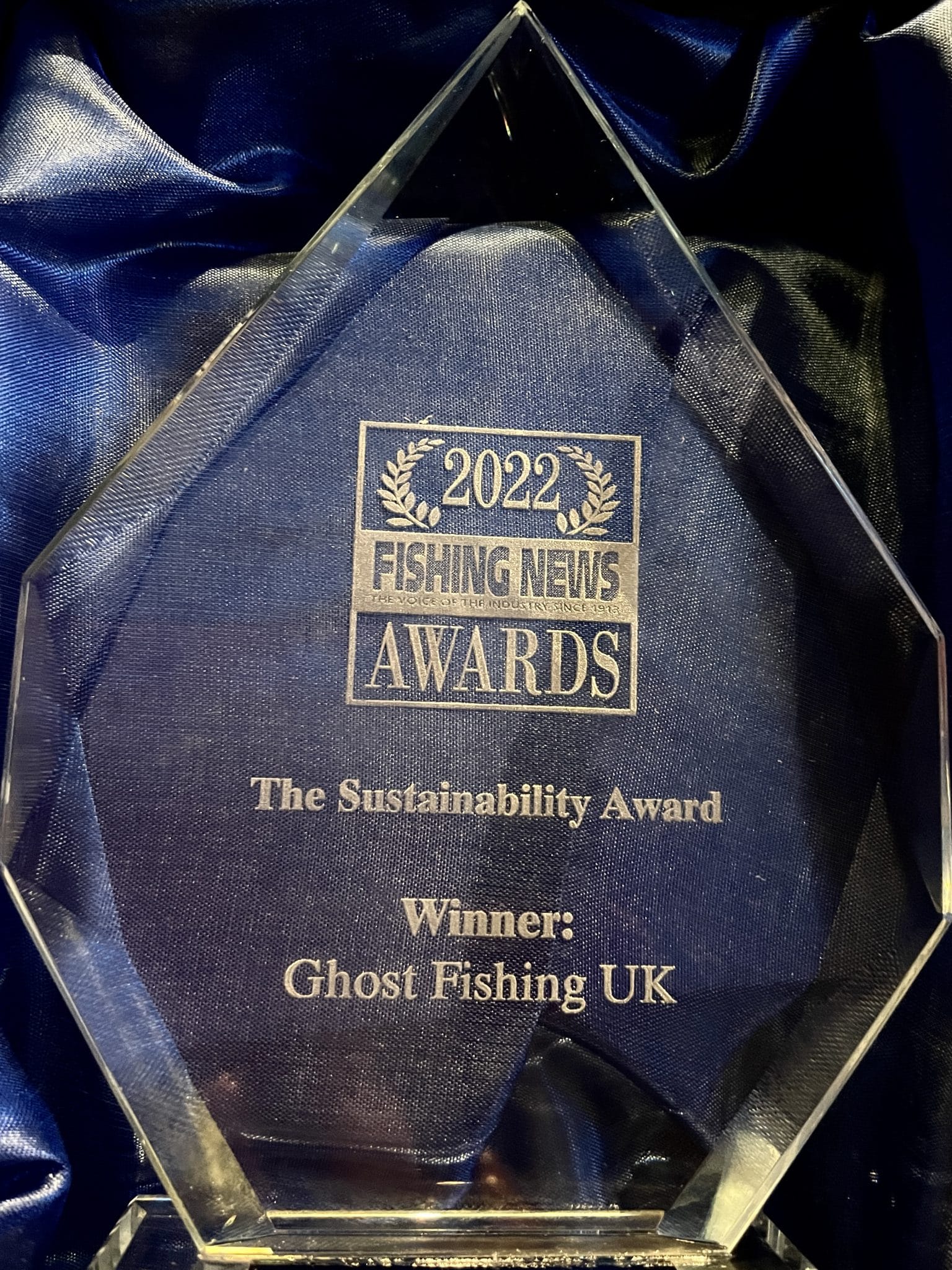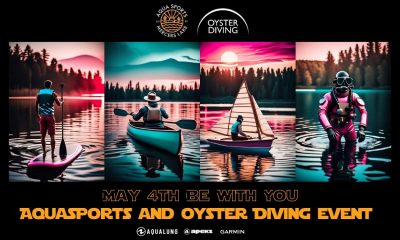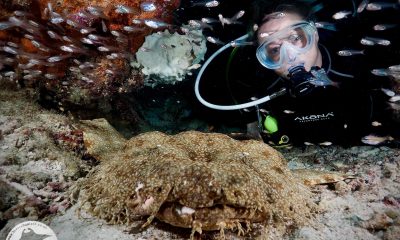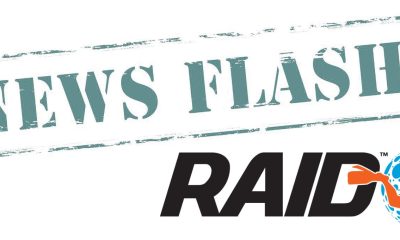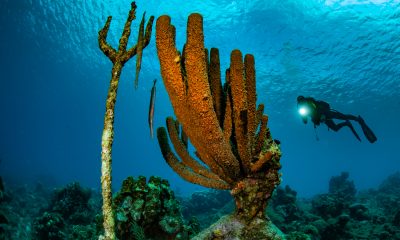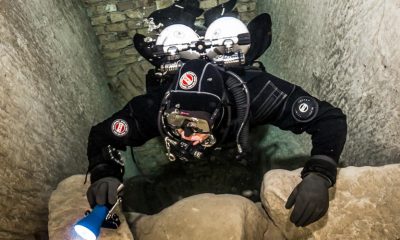Marine Life & Conservation
Ghost Fishing UK land the prize catch at the Fishing News Awards
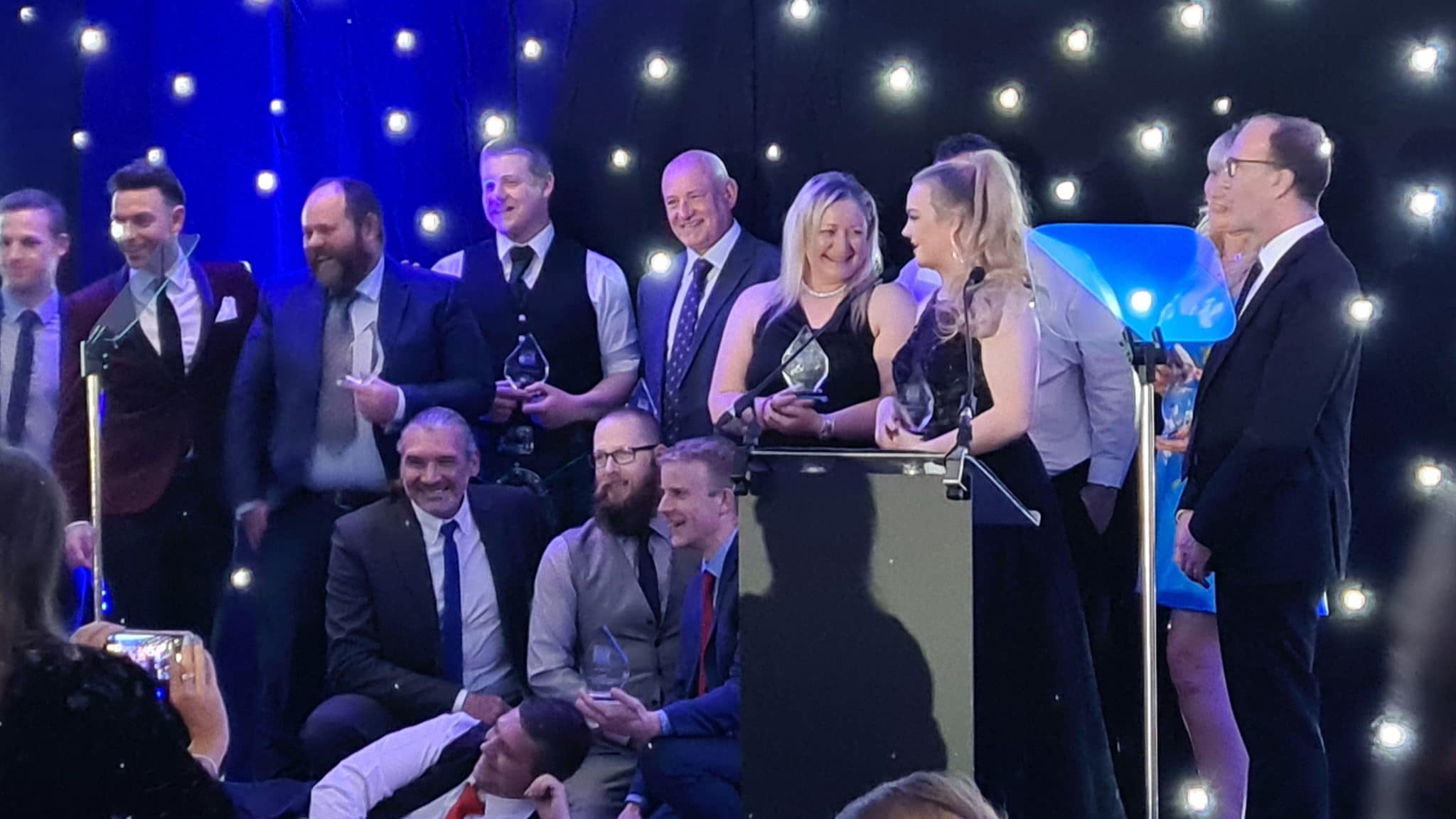
 The charity Ghost Fishing UK was stunned to win the Sustainability Award.
The charity Ghost Fishing UK was stunned to win the Sustainability Award.
The winners were selected by a panel of industry judges and the award recognises innovation and achievement in improving sustainability and environmental responsibility within the UK or Irish fishing industries in 2021.
Nominees must have demonstrated a unique and innovative response to an environmental sustainability issue within the UK or Irish industry, demonstrating that the project has gone above and beyond standard practice, and provided evidence of its impact. The judges look particularly for projects that have influenced a significant change in behaviour and/or that have inspired broader awareness and/or engagement.
Ghost Fishing UK originated in 2015, training voluntary scuba divers to survey and recover lost fishing gear, with the aim to either return it to the fishing industry or recycle it. The charity is run entirely by volunteers and has gone from strength to strength, only last year winning the Best Plastic Campaign at the Plastic Free Awards.
Now, the charity has also been recognised at seemingly the opposite end of the spectrum. This is a unique achievement as trustee Christine Grosart explains;
“We have always held the belief that working with the fishing industry is far more productive than being against it, in terms of achieving our goals to reduce and remove lost fishing gear.
The positive response to our fisheries reporting system that we received from both the fishing industry and the marine environment sector, was evidence that working together delivers results.
The feedback we got from the awards evening and the two-day Scottish Skipper Expo where we had an exhibit the following day, was that the fishing industry despises lost fishing gear as much as we do and the fishers here are very rarely at fault. It is costly to them to lose gear and they will make every effort to get it back, but sometimes they can’t. That is where we come in, to try to help. Everyone wins, most of all the environment. You can’t ask for much more.”
Following the awards, Ghost Fishing UK held an exhibit at the Scottish Skipper expo at the new P&J Live exhibition centre in Aberdeen.
“This gave us a fantastic opportunity to meet so many people in the fishing industry, all of whom were highly supportive of our work and wanted to help us in any way they could. This has opened so many opportunities for the charity and our wish list which has been on the slow burner for the last 7 years, was exceeded in just 3 days. We came away from the events exhausted, elated, humbled, grateful and most of all, excited.”
Trustee and Operations Officer, Fred Nunn, is in charge of the diving logistics such as arranging boats and organising the divers, who the charity trains in house, to give up their free time to volunteer.
He drove from Cornwall to attend the awards and the exhibition: “What a crazy and amazing few days up in Scotland! It was awesome to meet such a variety of different people throughout the industry, who are all looking at different ways of improving the sustainability and reduction of the environmental impact of the fishing industry.
It was exciting to have so many people from the fishing industry approaching us to find out more about what we do, but also what they could offer. Fishermen came to us with reports and offers of help, using their vessels and other exhibitors tried to find ways that their product or service could assist in our mission.”
- Ghost Fishing UK uses hard boat charters from Cornwall to Scotland for the diving projects, paying it forward to the diving community.
- The charity relies on reports of lost fishing gear from the diving and fishing community and to date has received well over 200 reports, culminating on over 150 survey and ghost gear recovery dives, amounting to over 1000 individual dives and diver hours by the volunteer team members.
- You can find more information at ghostfishing.co.uk
- If you are a fisher who knows of any lost fishing gear, you can report it to the charity here: ghostfishing.co.uk/fishermans-reporting
- The charity is heading to Shetland for a week-long project in the summer of 2023. If you would like to support this project, please contact them at: info@ghostfishing.co.uk
Chair of Ghost Fishing UK and professional technical diving instructor Dr Richard Walker was immensely proud of the team’s achievements;
“I’ve been a scuba diver since 1991 and have met thousands of divers in that time. I’d be hard pushed to think of one of them that wasn’t concerned about conservation of our marine environment. To be recognised by the fishing industry for our efforts in sustainability is a huge honour for us, and has encouraged our team to work even harder to find, survey and remove lost fishing gear from the seas. The fact that the fishing industry recognises our efforts, and appreciates our stance as a group that wants to work alongside them is one of the highlights of our charity’s history, and we look forward to building the relationship further.”
To find out more about Ghost Fishing UK visit their website here.
All images: Ghost Fishing UK
Marine Life & Conservation
Leading UK-based shark conservation charity, the Shark Trust, is delighted to announce tour operator Diverse Travel as a Corporate Patron

 Corporate Patrons provide a valuable boost to the work of The Shark Trust. The Trust team works globally to safeguard the future of sharks, and their close cousins, the skates and rays, engaging with a global network of scientists, policymakers, conservation professionals, businesses and supporters to further shark conservation.
Corporate Patrons provide a valuable boost to the work of The Shark Trust. The Trust team works globally to safeguard the future of sharks, and their close cousins, the skates and rays, engaging with a global network of scientists, policymakers, conservation professionals, businesses and supporters to further shark conservation.
Specialist tour operator Diverse Travel has operated since 2014 and is committed to offering its guests high quality, sustainable scuba diving holidays worldwide. Working together with the Shark Trust will enable both organisations to widen engagement and encourage divers and snorkellers to actively get involved in shark conservation.
“Sharks are truly at the heart of every diver and at Diverse Travel, we absolutely share that passion. There is nothing like seeing a shark in the wild – it’s a moment that stays with you forever!” says Holly Bredin, Sales & Marketing Manager, Diverse Travel.
“We’re delighted to celebrate our 10th year of business by becoming a Corporate Patron of the Shark Trust. This is an exciting partnership for Diverse and our guests. We will be donating on behalf of every person who books a holiday with us to contribute towards their vital shark conservation initiatives around the world. We will also be working together with the Trust to inspire divers, snorkellers and other travellers to take an active role – at home and abroad – in citizen science projects and other activities.”
Paul Cox, CEO of The Shark Trust, said:
“It’s an exciting partnership and we’re thrilled to be working with Diverse Travel to enable more divers and travellers to get involved with sharks and shark conservation. Sharks face considerable conservation challenges but, through collaboration and collective action, we can secure a brighter future for sharks and their ocean home. This new partnership takes us one more valuable step towards that goal.”
For more information about the Shark Trust visit their website here.
For more about Diverse Travel click here.
Marine Life & Conservation
Shark Trust Asks Divers to help with Shark Sightings this Global Citizen Science Month

 Whether you are stuck for ideas of what to do with the kids or are off on the dive trip of your dreams. You can get involved in Citizen Science Month and help the Shark Trust by providing vital data about sharks are rays both close to home and further afield.
Whether you are stuck for ideas of what to do with the kids or are off on the dive trip of your dreams. You can get involved in Citizen Science Month and help the Shark Trust by providing vital data about sharks are rays both close to home and further afield.
In addition to reporting the sharks and rays you see on your dives, the eggcases you find on the beach, the Shark Trust is looking for some specific data from divers who are asked to report any Oceanic Whitetip and Basking Sharks.
Oceanic Whitetip Sharks
The Shark Trust are looking specifically for Oceanic Whitetip Shark sightings over the coming weeks and months. So, if you are diving anywhere in the world, please report your sightings via the website or app.
Website: https://recording.sharktrust.org/
App: Search The Shark Trust in your app store
The Oceanic Whitetip. Known for their incredibly long dorsal and pectoral fins, this species was once the most abundant oceanic-pelagic species of shark on the planet.
Large and stocky, they are grey or brown above, and white below and famous for their huge rounded first dorsal fin and paddle-like pectoral fins. The fins also highly prized within the shark fin trade. Whilst they are mostly solitary, Oceanic Whitetips do occasionally hunt in groups.
An inquisitive species, they were easy prey for fisheries. Combined with their low reproductive rate, they were inevitably at high risk of population depletion. And declines of up to 99% have been reported in certain sea areas. They are listed as Critically Endangered on the IUCN Redlist (2019).
Conservation efforts to discourage further declines include listing on CITES Appendix II and CMS Appendix I. They’re also the only species prohibited from take by all the Tuna RFMOs (Regional Fisheries Management Organisations). However, these measures do not mean that Oceanic Whitetips are not still caught – whether targeted or as bycatch – in some parts of the world. With populations declining at such a high rate, effective implementation of management measures is essential to ensure that the species can recover.
If you are lucky enough to get an image of an Oceanic Whitetip and you record your sighting on the Shark Trust app or website YOU CAN WIN! All images submitted with sightings, that also give consent to use in conservation messaging, will be in with a chance to win an Oceanic Whitetip T-shirt and mug. The competition will run until the end of “Shark Month” in July – so keep those sightings (and images) coming in.
Basking Sharks
Basking Shark (Cetorhinus maximus) season is upon us, and the Shark Trust is asking everyone to keep an eye out for these majestic giants over the summer months. If you see any, you can record your sighting to the Basking Shark Sightings database.
Each year, these mighty fish return to British waters to feed on plankton. You may see one, (or a few if you’re really lucky) from around April-October. They can be seen feeding at the surface of the water, where they look like they’re basking in the sun. Thus, their name!
Sighting hotspots around the British Isles include southwest England, Isle of Man, north coast of Ireland, and western Scotland. The Sea of the Hebrides is the most prolific sightings area in Scotland, but they have been spotted all around the coast and have even ventured into some of the sea lochs. The Shark Trust has received thousands of sightings since the Basking Shark project began, but more data is needed to truly understand what is going on with population numbers and distribution. You can help by recording your sightings this summer.
Great Eggcase Hunt
The Shark Trust has an Easter Egg Hunt with a difference for you to try. Take part in the Great Eggcase Hunt and get involved with a big citizen science project that helps shark, ray and skate conservation. And it’s an enjoyable activity for all the family.
The Shark Trust also want snorkellers and divers to record their underwater eggcase findings. Underwater records help pinpoint exactly where sharks and skates are laying their eggs and can help link to beach records. Learning the depth and substrate that they lay on also helps better understand the species.
Find out more: https://www.sharktrust.org/great-eggcase-hunt
Whether you are diving, snorkelling or exploring on the beach you can take part in Citizen Science Month and get actively involved in shark and ray conservation. Find out more: www.sharktrust.org
-

 News3 months ago
News3 months agoHone your underwater photography skills with Alphamarine Photography at Red Sea Diving Safari in March
-

 News2 months ago
News2 months agoCapturing Critters in Lembeh Underwater Photography Workshop 2024: Event Roundup
-

 Marine Life & Conservation Blogs2 months ago
Marine Life & Conservation Blogs2 months agoCreature Feature: Swell Sharks
-

 Blogs1 month ago
Blogs1 month agoMurex Resorts: Passport to Paradise!
-

 Gear News3 months ago
Gear News3 months agoBare X-Mission Drysuit: Ideal for Both Technical and Recreational Divers
-

 Blogs2 months ago
Blogs2 months agoDiver Discovering Whale Skeletons Beneath Ice Judged World’s Best Underwater Photograph
-

 Gear Reviews2 months ago
Gear Reviews2 months agoGear Review: Oceanic+ Dive Housing for iPhone
-
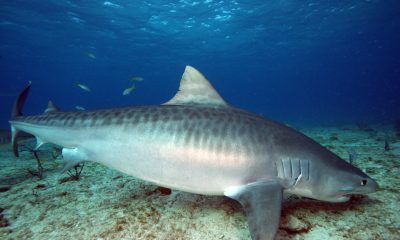
 Blogs3 months ago
Blogs3 months agoThe Thrilling Encounter with Tiger Sharks at Beqa Lagoon’s ‘The Colosseum’ with Coral Coast Divers



